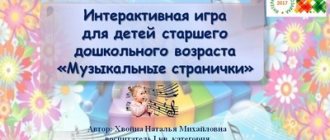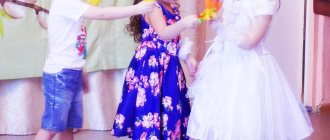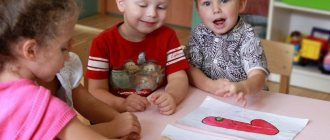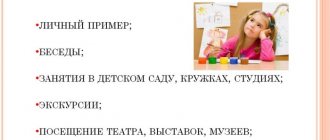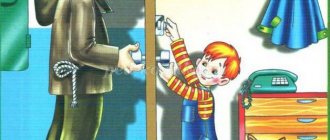The role of the teacher in music classes in kindergarten. Consultation
The role of the teacher in music classes in preschool educational institutions
Among the many recent problems related to preschool education, the problem of interaction between educators and specialists stands out.
And the problem of pedagogical interaction between the teacher and the music director is one of the most important: the success of the process of not only musical, but also the general aesthetic development of preschool children depends on its solution. Often, a teacher considers it his duty only to be present at a music lesson - in order to maintain discipline. Meanwhile, without the active help of a teacher, the productivity of music lessons turns out to be much lower than possible. Carrying out the process of musical education requires great activity from the teacher. When raising a child through music, preschool teachers must clearly understand its meaning. To do this, you need to clearly and distinctly understand by what means and methodological techniques you can establish the correct perception of music. We, music directors, would like to see the interest of teachers in the process of music lessons. When a child sees that the teacher completes all the tasks with interest, he becomes involved in the process with even greater inspiration. After all, the teacher is an absolute authority for him, and no matter what happens in class, the child will constantly focus on the teacher. The main form of musical education and training of a child in a preschool institution is music classes. A musical lesson is the main organizational form for implementing the tasks of musical education and development of children. In music classes, children are educated in a variety of ways: - Mental:
children gain knowledge about various aspects and phenomena of the surrounding reality, that is, knowledge about the seasons, holidays and everyday life of people.
Life experience is systematized. - Moral - volitional:
a feeling of love for the mother, the Motherland is cultivated, skills of cultural behavior are formed (in organizational aspects, the ability to listen, sing, dance in a group is cultivated. Purposefully engage in, the ability to complete the work started, overcome difficulties -
Physical:
in dancing and games form certain motor skills that develop certain muscle groups. -
Aesthetic:
in order to be able to listen and understand music, you need to feel it, to experience beauty. -
Singing skills:
purity of intonation, breathing, diction, coherence of singing intonations.
A musical lesson consists of several sections: — Introductory part:
movements in various formations (columns, ranks, links, pairs, in a circle, walking, running, dance steps (jump, straight, side gallop, fractional, round dance step, etc.). Movements to music create a cheerful, cheerful mood, help improve posture, coordination of arms and legs. -
Listening to music
-
Singing and songwriting
-
Learning to play children's musical instruments
(familiarity with the sound of instruments performed by an adult, selection of familiar melodies on various instruments -
Dance
-
Playing The teacher carries out mainly all pedagogical work in kindergarten - therefore, he cannot remain aloof from the music-pedagogical process.
The leading role in music classes belongs to the music director, since he can convey to children the features of musical works.
The leading role of the music director in no way reduces the activity of the teacher. In the process of classes, children acquire knowledge, skills, and abilities in listening to music, singing, musical-rhythmic movements, and playing the musical instrument. The teacher’s participation in a music lesson depends on the age group, the musical preparedness of the children and the specific objectives of the lesson. It is especially important for the teacher to participate in working with younger groups, where he plays the main role in games, dances, and songs. The younger the children, the more active the teacher has to be - provide assistance to each child, make sure that the children are not distracted, are attentive, and observe who and how they express themselves in the lesson. In the senior and preparatory groups
, children are given more independence, but the help of a teacher is still necessary.
He shows the movements of the exercises together with the music director, performs the dance with a child who does not have a partner, monitors the children’s behavior and the quality of execution of all program material. The teacher must be able to sing songs, demonstrate any exercise, game or dance, monitor whether all children are actively singing, whether they convey the melody of the song correctly, and pronounce the words. Since the music director is near the instrument, he is not always able to notice which of the children sang this or that word incorrectly. When children do not speak out much about what they hear, the teacher helps them with leading questions. When conducting musical-rhythmic movements with children of younger groups, the teacher plays with them, shows dance and imitation figures. In older groups, he carefully monitors whether the children perform the movements correctly and which of them needs help. By being present at classes and actively participating in them, the teacher not only helps the children, but also learns the material himself. The teacher-educator must: 1. Know the musical material of his group, be an active assistant to the music director in music classes. 2. Assist the music director in children’s mastering of the program musical repertoire, showing examples of precise execution of movements. 3. Conduct regular music lessons with the children of the group in the absence of a music director. 4. Learn movements with lagging children. 5. Deepen children's musical impressions by listening to musical works in a group using technical means. 6. Develop children’s musical skills (ear for melody, sense of rhythm) in the process of conducting didactic games. 7. Possess basic skills in playing children's musical instruments (metallophone, bells, tambourine, spoons, etc.). 8. Carry out the musical development of children, using all sections of work: singing, listening to music, musical-rhythmic movements, playing children's musical instruments, musical-didactic games. 9. Take into account the individual capabilities and abilities of each child. 10. Develop children’s independence and initiative in using familiar songs, round dances, musical games in classes, walks, morning exercises, and in independent artistic activities. 11. Create problem situations that activate children for independent creative expression. 12. Involve children in creative games, including familiar songs, movements, and dances. 13. Use children’s musical skills and abilities in classes for other types of activities. 14. Include musical accompaniment in the organization of classes and routine moments. 15. Take an active part in celebrations, entertainment, musical leisure, and puppet shows. 16. Prepare poetic selections of poetic material for entertainment and musical festivals. 17. Provide assistance in the manufacture of attributes and decoration of the music hall for holidays and entertainment. The role of the teacher in music lessons. The role of the teacher, the alternation of his passive and active participation, is different, depending on the parts of the lesson and tasks. Listening to music: 1. By personal example, instills in children the ability to listen carefully to a piece of music and expresses interest; 2. Maintains discipline; 3. Assists the music director in the use of visual aids and other teaching materials. Chanting, singing: 1. Does not participate in chanting 2. When singing, the teacher sits on a chair in front of the children to show, if necessary, the correct articulation of movement and pitch of sounds. 3. Supports singing when performing familiar songs, using means of facial and pantomimic expressiveness. 4. When improving a song being learned, he sings along in “difficult places.” 5. Does not sing with children when singing independently, emotionally expressively (with the exception of singing with children of early and younger age) Musical-rhythmic movements and games: 1. Participates in demonstrating all types of movements, giving appropriate recommendations to children. 2. Provides clear, precise, aesthetic standards of movements (with the exception of exercises to develop children’s creative activity). 3. Takes direct part in the performance of dances, dances, and round dances. At older preschool age, children perform familiar dances independently. 4. Corrects the execution of movements by individual children during a dance, exercise, or game. 5. Explains and monitors compliance with the conditions of the game, promoting the formation of behavioral skills during its implementation. 6. Takes one of the roles in the story game. 7. Observes discipline throughout the entire music lesson. The more actively the teacher does this work, the more new things children can learn in music classes, otherwise music classes turn into an endless repetition of the same thing, that is, “treading water.” The success of the teacher largely depends on the intensity of the music director’s work with him. The less prepared the teacher, the more the music director has to work directly with the children. Teachers often make the following mistakes in the classroom: - The teacher sits with an indifferent look. — The teacher interrupts the performance. — Disturbs the course of the lesson (enters and leaves the hall). A child’s life becomes more colorful, fuller, and more joyful if conditions are created not only in music classes, but also in the rest of the time in kindergarten for the manifestation of his musical inclinations, interests, and abilities. The skills acquired in classes must be consolidated and developed outside of them. In a variety of games, on walks, during the hours allotted for independent activities, children on their own initiative can sing songs, dance in circles, and listen to music. Thus, music enters into the child’s everyday life, musical activity becomes a favorite pastime. Holidays and entertainment And now it's time to talk about holiday matinees, which are regularly held in every age group. This is the Autumn holiday, New Year, February 23, March 8 and the graduation party in the preparatory group for school. A holiday in a kindergarten is, first of all, a lot of work done by the entire team, since many kindergarten employees are involved in this event. Therefore, the holiday is a common cause! But everyone has their own role, their own responsibilities. And it can be very difficult to separate the responsibilities of the music director and the teacher, because the successful holding of the holiday depends on the joint organized work of teachers. So, for the holiday, children dress smartly and according to their wishes, if the costumes are not specified in the holiday script. Before the matinee, as well as before the music lesson, the hall should be ventilated, and the assistant teacher should carry out a wet cleaning. It is necessary to maintain a festive atmosphere in the group: decorate the group room, hang colorful posters, turn on appropriate music, etc. Teachers must be dressed up, have suitable shoes, and greet children in high spirits. When preparing for the holiday, involve all the children if possible: try to find a role or poem for everyone. While learning poems and roles with children, monitor correct pronunciation, emphasis in words, and punctuation. Both teachers must be present at the celebration itself. Before the matinee, the presenter must lay out all the attributes required by the scenario, check their quantity, and place the required number of chairs. The main task of the leader is to carefully prepare for the performance of his duties. The presenter must know the matinee program well, must know the songs, dances, and games of children and, if necessary, help the children perform a dance or dramatization. At a matinee, the presenter should behave freely and naturally. He shouldn't be verbose. What needs to be communicated to children should be presented simply and clearly. The presenter’s speech is greatly enlivened by an appropriate joke, a question for children, teachers, guests (for example, have you seen how our kids dance with handkerchiefs?). The matinee should be carried out at a good pace. Prolonged performances and pauses tire children. The presenter must be resourceful! Unforeseen moments may arise at the matinee (the children did not have time to change clothes, the cast of performers has changed, a character did not appear on time, a musical number was missed, etc.). In such cases, the presenter must quickly find a way out of the difficult situation (jokes, riddles, involving the audience in resolving difficulties). During the holiday, do not touch children with your hands, and in order to rebuild them, you just need to tell them about it. The presenter needs to pronounce the text emotionally, loudly, clearly, without fear of the guests, maintaining a friendly atmosphere at the holiday. When children perform dances and round dances, perform movements with them. At the end of the holiday, the presenter needs to learn how to end the holiday in an organized manner! After the treat - thank the guest (an adult character, say goodbye to him, be sure to remind for what reason everyone has gathered in the hall, collect all the children and leave the hall in an orderly manner (except for New Year's holidays, when children take pictures with Santa Claus). A teacher who does not perform in any - roles, is with the children of his group. He sings and dances with the children. The teacher must also know the program and the entire course of the holiday well and be responsible for the area of work assigned to him (prepares attributes, costume details, changes the children’s clothes on time, corrects them if necessary costumes). Costumes for the holiday are taken by teachers in advance so that there is an opportunity to check everything: wash, hem, make missing parts. If parents are tasked with sewing or decorating a costume, preparing attributes, parents must bring them in advance so that teachers can check them, otherwise at the holiday It may happen that the elastic bands on the parsley caps break, the attributes break, etc. Parents can also take part in preparing the holidays: help in decorating the room, designing a wall newspaper, making costumes, playing small roles or reading poetry, performing musical numbers with own children. An announcement about the holiday is posted in advance so that parents know exactly when and what time the matinee will take place. It is good to discuss the past holiday at a pedagogical meeting, where the positive aspects of the holiday and the mistakes made are discussed. Before matinees, teachers should help decorate the hall for the holidays and remove all attributes after their matinee (preferably in place). And finally, I would like to say that the holiday is, first of all, a demonstration performance of our children, including us, so please treat it with great responsibility. And then everything will work out for us!
We recommend watching:
Introducing older preschoolers to folk culture in the context of the Federal State Educational Standard of preschool education Development of children's speech in preschoolers through music classes Experience of working as a music director in a kindergarten The role of song in the civic-patriotic education of preschool children
Similar articles:
Script of the musical and dance fairy tale “Kolobok” for the reporting concert at the preschool educational institution
